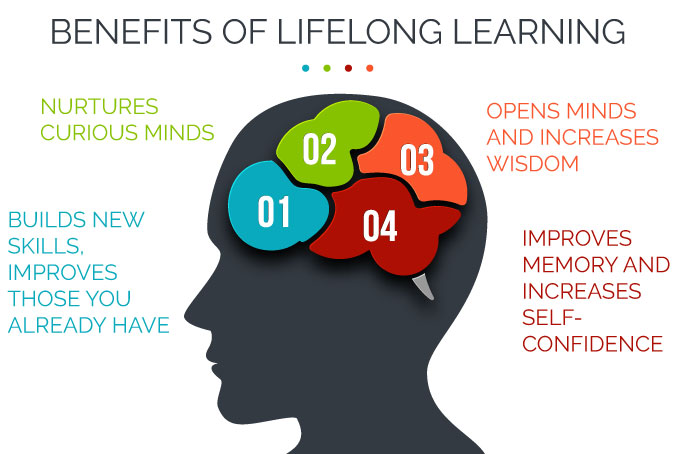Unlock Your Potential: A Guide to Learning New Skills

The Wonderful World of Lifelong Learning: Benefits & A Practical Guide
We often associate learning with our school years – textbooks, exams, and a structured curriculum. But what happens after that? The truth is, the most rewarding learning often takes place *outside* those formal structures. Embracing lifelong learning—the ongoing, voluntary, and self-motivated pursuit of knowledge for either personal or professional reasons—is incredibly valuable in today’s ever-changing world. This post will explore the numerous benefits of continuously acquiring new skills and offer practical advice to help you embark on your own learning journey.
Why Bother? The Benefits of Lifelong Learning
The advantages of lifelong learning are far-reaching, impacting various aspects of our lives. Let’s delve into some key benefits:
- Cognitive Enhancement: Learning new things isn’t just about acquiring knowledge; it actively strengthens your brain! Studies consistently show that continuous learning improves cognitive functions like memory, attention span, and problem-solving abilities. Think of it as exercise for your mind – the more you use it, the stronger it becomes. Engaging in novel tasks forces your brain to forge new neural pathways, promoting neuroplasticity—the brain’s ability to reorganize itself by forming new neural connections throughout life.
- Increased Confidence: Mastering a new skill, no matter how small, provides a significant boost to self-esteem and confidence. Successfully navigating challenges and seeing tangible progress builds a sense of accomplishment. This newfound confidence often spills over into other areas of your life, empowering you to take on bigger challenges.
- New Opportunities (Professional & Personal): In the professional realm, acquiring new skills can open doors to career advancement, increased earning potential, and even entirely new career paths. The job market is constantly evolving; possessing in-demand skills makes you more adaptable and valuable. On a personal level, learning a new language could unlock travel opportunities, while mastering photography might lead to a fulfilling hobby or even a side business.
- Improved Mental Well-being: Learning can be surprisingly therapeutic! It provides a sense of purpose and structure, combating boredom and feelings of stagnation. Focusing on a goal and making progress contributes to overall well-being and reduces stress.
- Staying Relevant & Adaptable: The world is changing at an unprecedented pace. Technology evolves rapidly, industries transform, and new challenges emerge constantly. Lifelong learning equips you with the adaptability needed to navigate these changes effectively and remain relevant in a dynamic environment.
Choosing Your Skill: Finding Your Passion
So, you’re convinced lifelong learning is worthwhile—excellent! But where do you start? Choosing a skill can feel overwhelming. Here’s how to narrow it down:
- Reflect on Your Interests: What genuinely excites you? What topics do you find yourself reading about or watching videos on in your free time? Starting with something you’re already interested in will significantly increase your motivation and enjoyment.
- Identify Your Goals: Are you looking for a career change, a hobby to enrich your life, or simply personal growth? Your goals should guide your skill selection. For example, if you want to improve your public speaking skills, that’s different than wanting to learn coding.
- Consider Market Demand (if applicable): If the goal is professional advancement, research which skills are currently in high demand within your industry or desired career path. Web development, data analytics, cybersecurity, and digital marketing are consistently popular choices.
- Start Small: Don’t try to learn everything at once! Begin with a focused area within a broader field. For example, instead of “learning coding,” start with “HTML & CSS basics.”
Resources Abound: Where to Learn
The beauty of lifelong learning today is the sheer abundance of resources available:
- Online Courses: Platforms like Coursera, edX, Udemy, Skillshare, and LinkedIn Learning offer a vast array of courses taught by experts in various fields. Many are affordable or even free!
- YouTube Tutorials: YouTube is an incredible resource for learning practically anything – from cooking to coding to playing the guitar. Search for tutorials on your chosen skill; you’ll be amazed at what you find.
- Free Online Resources: Websites like Khan Academy offer free educational content across a wide range of subjects, particularly in math and science.
- Libraries: Don’t underestimate the power of your local library! They often offer free classes, workshops, and access to online learning platforms.
- Community Colleges & Local Workshops: Community colleges frequently provide affordable courses on various topics. Look for local workshops or meetups related to your chosen skill.
- Mentorship/Networking: Connect with people who already have the skills you want to learn! Ask questions, observe their techniques, and consider seeking mentorship.
Staying Motivated: The Key to Success
Starting a new skill is easy; staying motivated through the inevitable challenges is where many learners stumble. Here’s how to keep your momentum:

- Set Realistic Goals: Break down your learning journey into smaller, manageable goals. Celebrating small victories keeps you engaged and reinforces positive behavior.
- Create a Schedule: Dedicate specific times each week (or even daily) to learning. Consistency is key! Treat it like an important appointment.
- Find an Accountability Partner: Having someone to check in with—a friend, family member, or online community—can provide valuable support and motivation.
- Join a Community: Connect with other learners through online forums, social media groups, or local meetups. Sharing experiences and supporting each other can be incredibly helpful.
- Don’t Be Afraid to Ask for Help: Everyone struggles at times! Don’t hesitate to reach out for assistance when you encounter difficulties.
- Remember Your “Why”: When motivation wanes, revisit the reasons why you started learning in the first place. Remind yourself of the benefits and how this skill will enrich your life.
Lifelong learning is a journey, not a destination. Embrace the process, celebrate your progress, and enjoy the rewards that come with continuously expanding your knowledge and skills! You’ll be surprised at what you can achieve.



